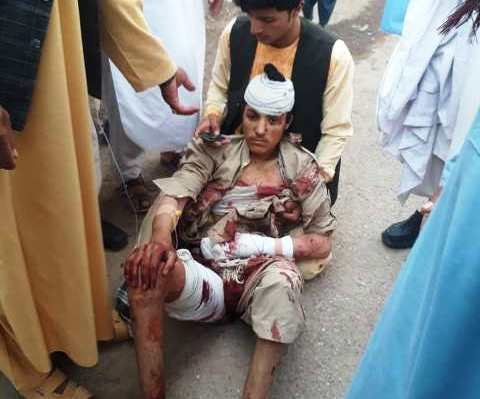KABUL (Pajhwok): The number of civilian casualties in the Afghanistan conflict was more than double in July compared to that recorded the previous month, a Pajhwok tally shows.
More than 3,600 civilians were either killed or injured in the conflict-related incidents across the country in July compared to June’s nearly 1500 casualties.
Civilian casualties jump amid intensified efforts on national, regional and international levels to find a negotiated end to the Afghanistan conflict.
According to Pajhwok Afghan News reports, nearly 1,500 people suffered casualties in June, but the figures rose to 3,625 in July.
Pajhwok reports based on different sources show 1,957 people lost their lives and 1,668 others sustained injuries in attacks in 32 provinces of the country in July.
The casualties in July resulted from 246 attacks — 86 percent up compared to May’s attacks.
The Taliban carried out 89 attacks, unidentified gunmen 73, Afghan forces 70 and foreign forces carried out 14 attacks.
July’s attacks show among every 36 persons, 19 suffered casualties in face to face fighting, seven in suicide attacks, four in airstrikes and explosions, and two in targeted attacks.
In July, most or 26 attacks took place in Faryab, 24 in Kandahar, 20 in Ghazni, 19 in Nangarhar and the rest 157 in other 28 provinces.
No report about casualties was received from Bamyan and Nuristan provinces in July. For the first time in 2019 attacks were carried out in central Panjsher province.
Casualties
Pajhwok reports show 1957 people were killed and 1,668 others were injured in July.
Rebels, security forces and civilians were among the casualties. But Pajhwok could not compile specific casualty figures because different sources provided different accounts.
Last month, there were attacks and casualties on a daily basis. Most of the casualties happened on July 1 when 159 people were killed and 173 others injured.
The deadliest attack happened near Gulbahar Tower in Kabul on logistics and technical departments of the Ministry of Defense, in which 11 people were killed and 116 others injured.
According to experts, increase in casualties depends on the nature of tactics used in fighting.
They say the risk of casualties in guerrilla fighting and attacks is higher in populated areas.
Reasons behind intensified clashes
Atiqullah Amarkhel, a retired general and military expert, said: “War means an abnormal life. It sometimes escalates and sometimes cools down.”
He said there were many reasons behind a decline in war. “May be sometimes the warring sides take a break to prepare supplies.”
He said though he believed little in the ongoing peace talks but the process could have some impact on the war’s intensification or reduction.
He said intensifying attacks by either side was aimed at seeking leverage in on the ongoing peace negotiations and imposing their terms.
Ministry of Defense spokesman Fawad Aman disagreed with Pajhwok’s casualty figures and said the Afghan forces by switching to offensive mode from defensive carried out more attacks last month
Afghan forces, supported by foreign troops, have been fighting the Taliban over the past 18 years. Past experiences show casualties and attacks surge in Afghanistan in summer and decline in winter.
Casualties in the first seven months of the ongoing year fell by 10 percent compared figures during the same period in 2018.
In 2017, around 25,000 people suffered casualties compared to around 27,000 people killed or injured in 2018. In the last seven months of 2019, more than 13,700 people suffered casualties.
Call for ceasefire
Palwasha Stanikzai, a resident of central Maidan Wardak province, said they were hoping the eighth round of peace talks between the US and Taliban would result into a lasting peace in the country.
“I call on both the warring sides to stop killing their own brothers and do not let your innocent sisters become widows and become burden on others.”
“Agree to a ceasefire before the peace talks end up in an agreement, join your hands for this good job so we no more sacrifice our own people,” she said.
Ahmad Shoaib, a resident of Farah City, told Pajhwok he lost one of his brothers to a suicide attack two years ago. “Peace is blessing. The Afghans are being killed on different pretexts for the last four decades. Our life is really painful.”
Shoaib asked parties to the conflict not to lose the present opportunity of peace and be ready for compromises to end the bloodshed by making the peace process a success story.
On the other hand, hundreds of people in Qarabagh district of Kabul in a gathering on Saturday asked the warring sides to agree to a ceasefire.
The UN also called July as the deadliest month of the ongoing year and said 1,500 civilians suffered casualties during that period alone.
mds/ma







GET IN TOUCH
NEWSLETTER
SUGGEST A STORY
PAJHWOK MOBILE APP